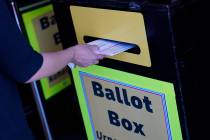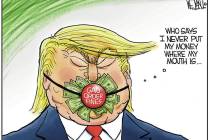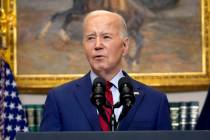Maybe we’ll ‘allow’ you to pay it back
Anyone who's ever borrowed money from the mob -- or a credit card company, for that matter -- knows that seeing you pay off your debt is the last thing such characters ever seem to want.
If you never pay back the principal, after all, they can keep draining you with interest charges, essentially forever.
At the higher levels of finance, such creditors gain an even more important fringe benefit: control. Those foolish enough to accept funding from, er ... "non-traditional" lenders soon learn that such a lender doesn't require 51 percent of the voting stock to control your company.
The test is simple. If a lender is happy when you pay off your obligation, you're fine. But if an attempt to pay off your debt leads the lender to feign hurt feelings, asking, "Now why would you want to do that?" ... watch out.
There were many causes for last year's American bank liquidity crisis. Some of it stemmed from the intersection of federal regulators' "reserve requirements" and arcane rules concerning how hard assets -- like real estate and home mortgages -- could be valued on a banker's books.
Much blame falls on Congress and the Federal Reserve, the former for effectively blackmailing home lenders into making risky loans in pursuit of political goals, while the latter artificially held down interest rates, sending false financial signals of clear seas ahead.
But most of the problem was the bankers' own fault. They invested in complex mortgage derivatives seeking high returns without due consideration to what could happen if the housing price bubble collapsed -- or even how such derivatives could later be untangled to show who really owns what debt instruments.
Regardless, instead of simply allowing mismanaged banks to fail, whereupon their good assets could have been swept up by more cautious managers in bankruptcy auctions, the Federal Reserve and the Bush Treasury Department last fall managed to convince Congress to intervene, creating the Troubled Asset Relief Program -- "TARP" -- from which bankers could borrow tax loot by the billions.
Many banks did. Many now regret it.
In exchange for the federal bailouts, Congress imposed new rules on banks that accepted the money, including limits on executive compensation. That led JP Morgan CEO Jamie Dimon to call TARP a "scarlet letter," USA Today reported Monday.
"TARP funds have become an irritant, and any bank that has the ability will pay it back," predicted analyst Richard Bove of Rochdale Securities.
BB&T CEO Kelly King now calls the government's investment "destructive," vowing to repay his firm's TARP money "as soon as it is humanly possible."
To which the Federal Reserve replies, "Not so fast."
Before Washington will allow the banks to repay their loans -- yes, they're using the word "allow" -- the banks must first "show they continue to lend, maintain minimum capital levels, and raise equity and debt from private investors," USA Today reports. "The Fed has said it will say this week which banks have met those conditions."
The watchdogs are merely "protecting" us, many will insist.
Perhaps. But here, as with the parallel auto industry "bailouts," Americans are getting a quick, harsh lesson in the fallacy of the premise that government can or will apply to any industry merely "light-handed, minimally intrusive regulation."
Once they're allowed in the door, saying goodbye to this bunch is like trying to evict a couple guys with no necks from Cleveland or Chicago after you've let them loan you "just a little money to tide you over."























